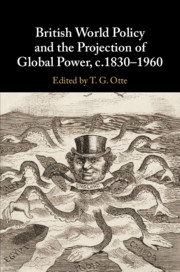Book contents
- British World Policy and the Projection of Global Power, c.1830–1960
- British World Policy and the Projection of Global Power, c.1830–1960
- Copyright page
- Dedication
- Contents
- Notes on the Contributors
- Preface and Acknowledgements
- Introduction: British World Policy and the White Queen’s Memory
- 1 The War Trade Intelligence Department and British Economic Warfare during the First World War
- 2 The British Empire and the Meaning of ‘Minimum Force Necessary’ in Colonial Counter-Insurgencies Operations, c.1857–1967
- 3 Yokohama for the British in the Late Nineteenth Century: A Hub for Imperial Defence and a Node of Influence for Change
- 4 ‘The Diplomatic Digestive Organ’: The Foreign Office As the Nerve Centre of Foreign Policy, c.1800–1940
- 5 Financial and Commercial Networks between Great Britain and South America during the Long Nineteenth Century
- 6 Britain through Russian Eyes: 1900–1914
- 7 Imperial Germany’s Naval Challenge and the Renewal of British Power
- 8 Views of War, 1914 and 1939: Second Thoughts
- 9 The Ambassadors, 1919–1939
- 10 The Tattered Ties that Bind: The Imperial General Staff and the Dominions, 1919–1939
- 11 Seeking a Family Consensus? Anglo-Dominion Relations and the Failed Imperial Conference of 1941
- 12 Imperial Hubs and their Limitations: British Assessments of Imposing Sanctions on Japan, 1937
- Index
Introduction: British World Policy and the White Queen’s Memory
Published online by Cambridge University Press: 06 September 2019
- British World Policy and the Projection of Global Power, c.1830–1960
- British World Policy and the Projection of Global Power, c.1830–1960
- Copyright page
- Dedication
- Contents
- Notes on the Contributors
- Preface and Acknowledgements
- Introduction: British World Policy and the White Queen’s Memory
- 1 The War Trade Intelligence Department and British Economic Warfare during the First World War
- 2 The British Empire and the Meaning of ‘Minimum Force Necessary’ in Colonial Counter-Insurgencies Operations, c.1857–1967
- 3 Yokohama for the British in the Late Nineteenth Century: A Hub for Imperial Defence and a Node of Influence for Change
- 4 ‘The Diplomatic Digestive Organ’: The Foreign Office As the Nerve Centre of Foreign Policy, c.1800–1940
- 5 Financial and Commercial Networks between Great Britain and South America during the Long Nineteenth Century
- 6 Britain through Russian Eyes: 1900–1914
- 7 Imperial Germany’s Naval Challenge and the Renewal of British Power
- 8 Views of War, 1914 and 1939: Second Thoughts
- 9 The Ambassadors, 1919–1939
- 10 The Tattered Ties that Bind: The Imperial General Staff and the Dominions, 1919–1939
- 11 Seeking a Family Consensus? Anglo-Dominion Relations and the Failed Imperial Conference of 1941
- 12 Imperial Hubs and their Limitations: British Assessments of Imposing Sanctions on Japan, 1937
- Index
Summary
Scholars of Britain’s external relations in the nineteenth and twentieth centuries readily acknowledge the global nature of their subject. Yet in practice, they tend to dissect it along bilateral lines or with an exclusive focus on the imperial periphery. The tension between Britain’s global strategic interests and its ability to safeguard them has likewise long been the subject of scholarly debates, invariably accompanied by more or less explicit assumptions about the nation’s decline in the twentieth century. Already Arnold J. Toynbee, in reflecting on the origins of the Second World War, contrasted Britain’s assumed position as ‘the arbiter of Europe’ from around the time of the War of the Spanish Succession at the beginning of the eighteenth century until the final years of peace before 1914 with the country’s reduced circumstances in the interwar period.
- Type
- Chapter
- Information
- Publisher: Cambridge University PressPrint publication year: 2019
- 1
- Cited by

